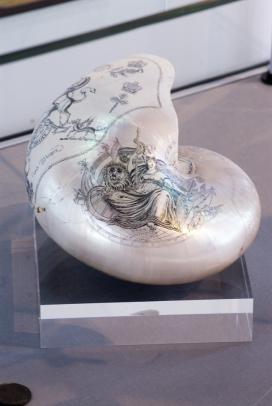In Greater Manchester
- How money from slavery made Greater Manchester
- The importance of cotton in north west England
- The Lancashire cotton famine
- Smoking, drinking and the British sweet tooth
- Black presence in Britain and north west England
- Resistance and campaigns for abolition
- The bicentenary of British abolition
Global

Nautilus shell engraved with Britannia
Colonialism and the expansion of empires
The transatlantic slave trade was only one part of a process of wider European global colonisation. Before establishing a foothold in the Americas, European powers including the Portuguese, Dutch and the British had been actively trading throughout Asia. There were important trade routes especially for silk and spices across India, Indonesia and into China.
The East India Company was both Britain’s trading and political control in India and East Asia from 1600-1874.
The competition between European countries for trade, power and profit led to the conquest of new lands. The colonisation of the Caribbean and North and South America and the development of the transatlantic slave trade was an indication of this with the Portuguese, Spanish, Dutch and British all establishing strong footholds.
Different countries abolished slavery in the Americas at different times. Denmark was the first to abolish slavery in its American colonies in 1803; and the Portuguese were the last in 1869. The British abolition of the slave trade in 1807, and finally slavery itself in 1838, actually stimulated the growth of the British Empire and development of other trade links.
Britain looked for legitimate trade links to retain its profit and power while at the same time maintaining its moral high ground as it persuaded other European countries to abolish slavery. Palm oil and cocoa became important commercial crops in the trade with Africa.
However, after abolition in 1838 the British needed another supply of labour in their Caribbean colonies to replace the freed enslaved Africans. They turned to their colonies in Asia and imported thousands of poor indentured labourers from south Asia into Africa and the Americas to labour in conditions that were little better than the enslaved Africans before them.
After slavery, Europeans continued their exploitation of overseas colonies, most notably in the ‘scramble for Africa’. Between the 1880s and the First World War European powers desperate for access to African natural resources divided up much of the continent between them – literally with a ruler hence the straight lines of many African borders.
The British looting of Benin (1897) shows the inequalities and the damage done to African countries in the process of colonisation. The inequalities and exploitation of the colonial past remain in global trade today, hence the attempts to introduce ‘fair trade’.